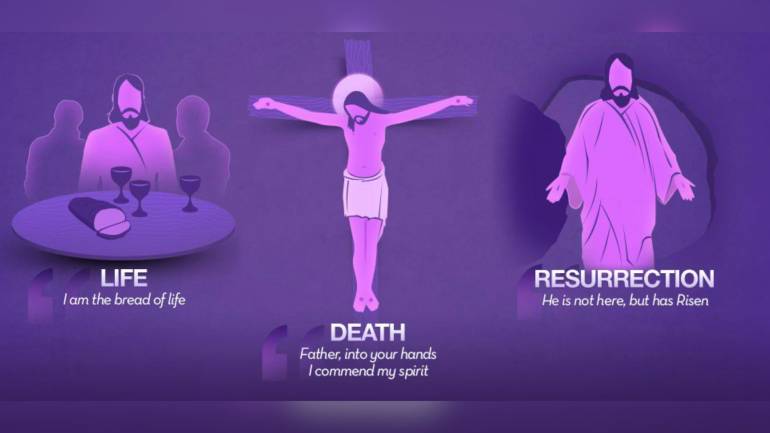Paschal Mystery in everyday Life

“Kuch din meri tabiyat tik nahi ho. Suna suna lagta hai, jism mei takat nahi ho!” said the cook in the kitchen. (I was not feeling well and felt so dry. I had no strength in my body).
So, someone close to us passes away. But the other deaths and rises are less obvious. An experience of dying might be when you have an argument with a friend that leaves you feeling upset, or you see a homeless mother and child and don't know what to do to help. And more similar stories!
No doubt, this is the cry of every living creature on earth, be they human beings or animals! This reminded me of the Word: “he will wipe every tear from their eyes. Death will be no more; mourning and crying and pain will be no more, for the first things have passed away." And he that sat upon the throne said, “Behold, I make all things new." (Rev. 21: 3-5)
Certainly, we all have a share of suffering in the different areas of life—a Paschal Mystery in our everyday lives. Moreover, for the crown of creation, the ascension is the culmination of the Paschal Mystery. As the Catechism of the Catholic Church (CCC) notes, the Paschal Mystery is fully understood as Christ's passion, crucifixion, death, burial, descent into hell, resurrection and ascension (CCC 512).
Paschal Mystery teaches us that Jesus bore our suffering and moved through it to resurrection. So that we too can follow this path, actively joining God's loving solidarity with all suffering since the foundation of the world. The Paschal Mystery is so important to us that it is an integral part of our spiritual life. It is the faith-filled journey of living with Christ that embraces difficulties or death, only to rise exultantly to a new reality in our relationship with God and our neighbor.
The Paschal mystery has two aspects: by his death, Christ liberates us from sin; by his Resurrection, he opens for us the way to a new life. Ultimately, his death on the cross and his resurrection bring this paradox to a climax. It is this paradox, which we call the Paschal Mystery, that is the heart of Christian discipleship. This is how we are transformed. Jesus also tells whoever wants to follow him that they must deny themselves and carry their crosses. We are not just called to follow him but to be true disciples. Those who encountered Jesus no longer followed him but rather witnessed him as a true disciple. For example, the Samaritan Woman at the Well, Zacchaeus, the Tax Collector, Mary Magdalene, and so on...
Before He suffered the pains of the crucifixion, Jesus had suffered the pain of rejection and betrayal of His deepest friends. Their leader, Peter, was no different from the rest. Peter was among the equals. They entrusted the keys of heaven to him. He received the revelation that Jesus is the Christ. Jesus must have expected more from Peter. Peter had denied Him three times. Jesus' friends' abandonment in those trying moments was indeed a long and lonely event, a feeling we all share in our workplaces, relationships, and with those we love. Jesus because we have a share of the loneliness He felt as we understand it in our everyday lives. We hear stories of broken relationships between husbands and wives, dysfunctional families, and abandoned children. Parents and children's misunderstandings, friends quarrels and so on...
In all these human experiences, we are never alone. God, in the person of Jesus, suffered the same. He suffered for and with us. We must connect our suffering with the suffering of Jesus so that this union will be a worthy sacrifice to the Father. Only then will our suffering have salvific significance.
Our sufferings can be a result of love if we are willing to sacrifice for the one we love. There can be a lot of kinds of sufferings in this world we live in but God assures us that Jesus is our hope and sufferings are temporary. Our sufferings compel us to seek God and realize what is truly essential in life.
We can relate our sufferings to Jesus when we remember that He offered His unconditional love for our salvation. Whenever we suffer because of love, we can ask Jesus to give us the strength to endure. He too has suffered before and He continuously suffers with us even today because of His great love for humanity.
The sufferings of Jesus Christ are part of God’s saving plan. The Paschal Mystery is the climax of Jesus’ suffering. God is always with us in the Paschal Mystery of everyday sufferings, for Jesus suffers for us and with us.
Radio Veritas Asia (RVA), a media platform of the Catholic Church, aims to share Christ. RVA started in 1969 as a continental Catholic radio station to serve Asian countries in their respective local language, thus earning the tag “the Voice of Asian Christianity.” Responding to the emerging context, RVA embraced media platforms to connect with the global Asian audience via its 21 language websites and various social media platforms.














